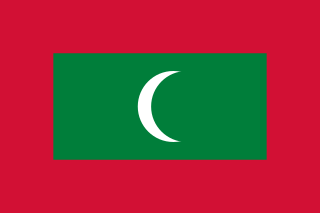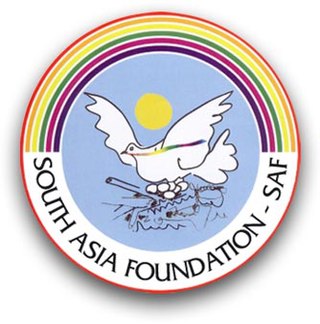Related Research Articles

Uppsala University (UU) is a public research university in Uppsala, Sweden. Founded in 1477, it is the oldest university in Sweden and the Nordic countries still in operation.

The South Asian Association for Regional Cooperation (SAARC) is the regional intergovernmental organization and geopolitical union of states in South Asia. Its member states are Afghanistan, Bangladesh, Bhutan, India, Maldives, Nepal, Pakistan, and Sri Lanka. SAARC comprises 3% of the world's land area, 21% of the world's population and 5.21% of the global economy, as of 2021.

The Maldives national football team represents the Maldives in international football and is controlled by the Football Association of Maldives. It is a member of the Asian Football Confederation (AFC).
Ethnic groups in South Asia are ethnolinguistic groupings within the diverse populations of South Asia, including the countries of Bangladesh, Bhutan, India, Maldives, Nepal, Pakistan, and Sri Lanka. Afghanistan is variously considered to be a part of both Central Asia and South Asia, which means Afghans are not always included among South Asians, but when they are, South Asia has a total population of about 2.04 billion.
The SAARC Consortium on Open and Distance Learning (SACODiL) is a regional cooperation agency set up under the auspices of the South Asian Association for Regional Cooperation (SAARC) with the objectives of promoting cooperation and collaboration among institutions imparting knowledge through open and distance learning within member states, and promoting its use as a viable and cost-effective method of imparting quality education at all levels.

Asian University for Women (AUW) is an independent, international university in Chittagong, Bangladesh. AUW admits students solely on the basis of merit, regardless of their family's income level. Currently, 85% of AUW students are on scholarship support with many being the first in their family to attend a university. AUW offers two pre-collegiate bridge programs called Access Academy and Pathways for Promise, as well as a three-year undergraduate program based on the liberal arts and sciences. As of 2023, AUW has around 1300 students enrolled from over 35 ethnicities across Asia and the Middle East.

South Asia is home to several hundred languages, spanning the countries of Afghanistan, Bangladesh, Bhutan, India, Maldives, Nepal, Pakistan, and Sri Lanka. It is home to the fourth most spoken language in the world, Hindi–Urdu; the seventh most spoken language, Bengali; and thirteenth most spoken language, Punjabi. Languages like Bengali, Tamil and Nepali have official/national status in more than one country of this region. The languages in the region mostly comprise Indo-Iranic and Dravidian languages, and further members of other language families like Austroasiatic, and Tibeto-Burman languages.

The Indian subcontinent is a physiographical region in Southern Asia, mostly situated on the Indian Plate, projecting southwards into the Indian Ocean from the Himalayas. Geographically, it spans the countries of Bangladesh, Bhutan, India, Maldives, Nepal, Pakistan, and Sri Lanka. Although the terms "Indian subcontinent" and "South Asia" are often used interchangeably to denote the region, the geopolitical term of South Asia frequently includes Afghanistan, which is not considered a part of the subcontinent.

South Asia is the southern subregion of Asia, which is defined in both geographical and ethnic-cultural terms. With a population of 2.04 billion living in South Asia, it contains a quarter (25%) of the world's population. As commonly conceptualised, the modern states of South Asia include Bangladesh, Bhutan, India, the Maldives, Nepal, Pakistan, and Sri Lanka, with Afghanistan also often included, which may otherwise be classified as part of Central Asia. South Asia borders East Asia to the northeast, Central Asia to the northwest, West Asia to the west and Southeast Asia to the east. Apart from Southeast Asia, Maritime South Asia is the only subregion of Asia that lies partly within the Southern Hemisphere. The British Indian Ocean Territory and two out of 26 atolls of the Maldives in South Asia lie entirely within the Southern Hemisphere. Topographically, it is dominated by the Indian subcontinent and is bounded by the Indian Ocean in the south, and the Himalayas, Karakoram, and Pamir Mountains in the north.

The 2010 South Asian Games, officially the XI South Asian Games, was a major multi-sport event that took place from 29 January to 8 February 2010 in Dhaka, Bangladesh. This was the third time that the Bangladeshi capital hosted the South Asian Games, thus becoming the first city to hold the games three times.
The Maldives national football team has represented the Maldives in international football since 1979. Their first match came against Seychelles at the 1979 Indian Ocean Island Games. The team has never qualified for a major international tournament.

Secretary-General of the South Asian Association for Regional Cooperation is head of a SAARC Secretariat, which is headquartered in Kathmandu, Nepal. SAARC is an economic and geopolitical union between the eight South Asian member nations, Afghanistan, Bangladesh, Bhutan, India, Maldives, Nepal, Pakistan and Sri Lanka. Secretary-General is appointed for a three-year term by election by a council of Ministers from member states. Secretary-General is assisted by eight deputies, one from each nation, who also reside in Kathmandu. SAARC Secretariat was established in Kathmandu on 16 January 1987 by Bangladeshi diplomat Abul Ahsan, who was its first Secretary-General, and was inaugurated by King Birendra Bir Bikram Shah of Nepal. Since its creation, its member nations have contributed to a total of fourteenth General Secretaries. Golam Sarwar from Bangladesh is the current Secretary-General of SAARC, having assumed charge on 4 March 2023.

Ferdinando Sardella, born 1960, is a Swedish scholar of the history of religions, Hinduism, and religious studies, the former director and coordinator of the Forum for South Asia Studies at Uppsala University.

South Asia Foundation (SAF) was founded by UNESCO Goodwill Ambassador Madanjeet Singh in 2000. The South Asia Foundation (SAF) is a secular, non-profit and non-political international organization, comprising eight autonomous chapters: Afghanistan, Bangladesh, Bhutan, India, Maldives, Nepal, Pakistan and Sri Lanka.
Cricket was included for the first time at the 2010 South Asian Games, hosted by Dhaka, Bangladesh. A men's 20-over tournament was played from 31 January to 7 February 2010.
The Metropolis of Singapore and South Asia is a diocese of the Ecumenical Patriarchate of Constantinople in the Eastern Orthodox Church. It is centered in Singapore and has jurisdiction over Eastern Orthodox Christians in the countries of Singapore, Indonesia, Malaysia, Brunei, East Timor, the Maldives, Sri Lanka, Bangladesh, India, Nepal, Bhutan, Pakistan and Afghanistan. It was founded in January 2008 by the Holy Synod of the Ecumenical Patriarchate of Constantinople.

Results of India women's national football team from 2010 to 2019.

Hinduism is the largest religion in South Asia with about 1.2 billion Hindus, forming just under two-thirds of South Asia's population. South Asia has the largest population of Hindus in the world, with about 99% of all global Hindus being from South Asia. Hinduism is the dominant religion in India and Nepal and is the second-largest religion in Bangladesh, Pakistan, Sri Lanka, and Bhutan.
This is a list of the Nepal national football team results from 1990 to 2009.
References
- 1 2 3 4 5 "Forum for South Asia Studies". Uppsala Universitet. Archived from the original on 2 February 2014. Retrieved 21 January 2014.
- ↑ "Forum for South Asia Studies". Uppsala Universitet. Archived from the original on 2 February 2014. Retrieved 21 January 2014.